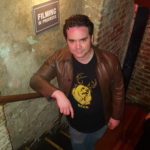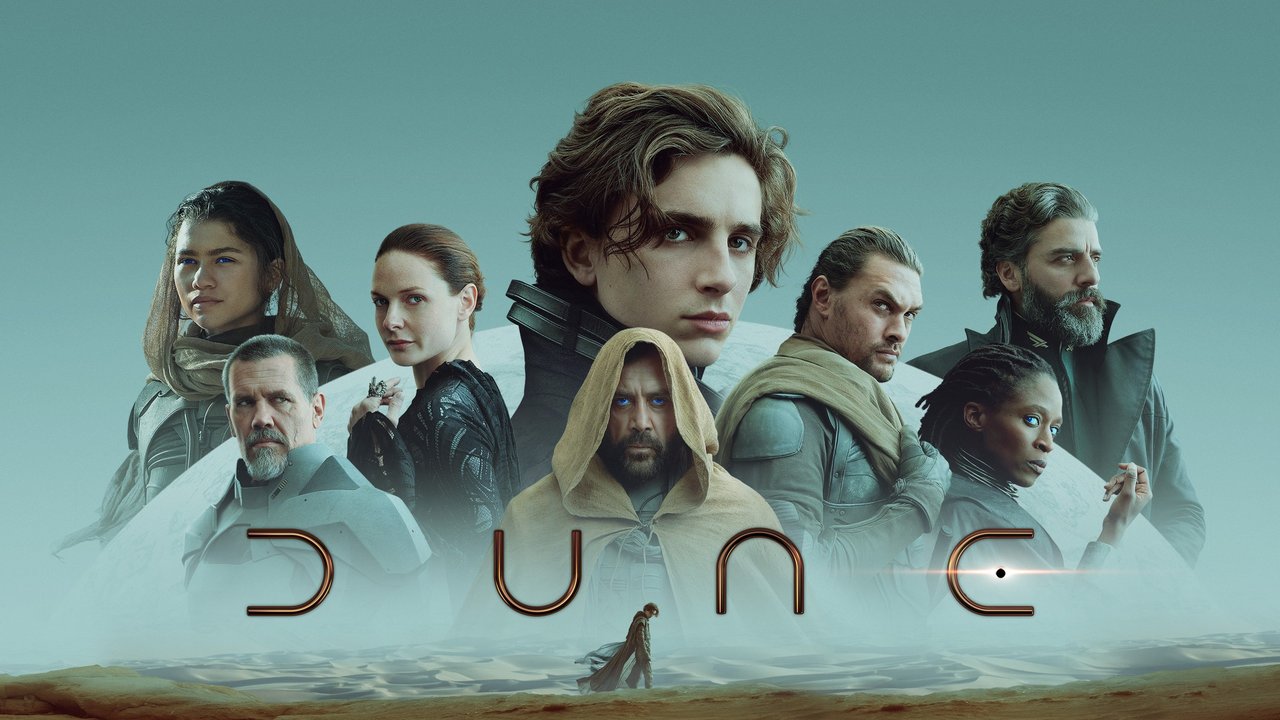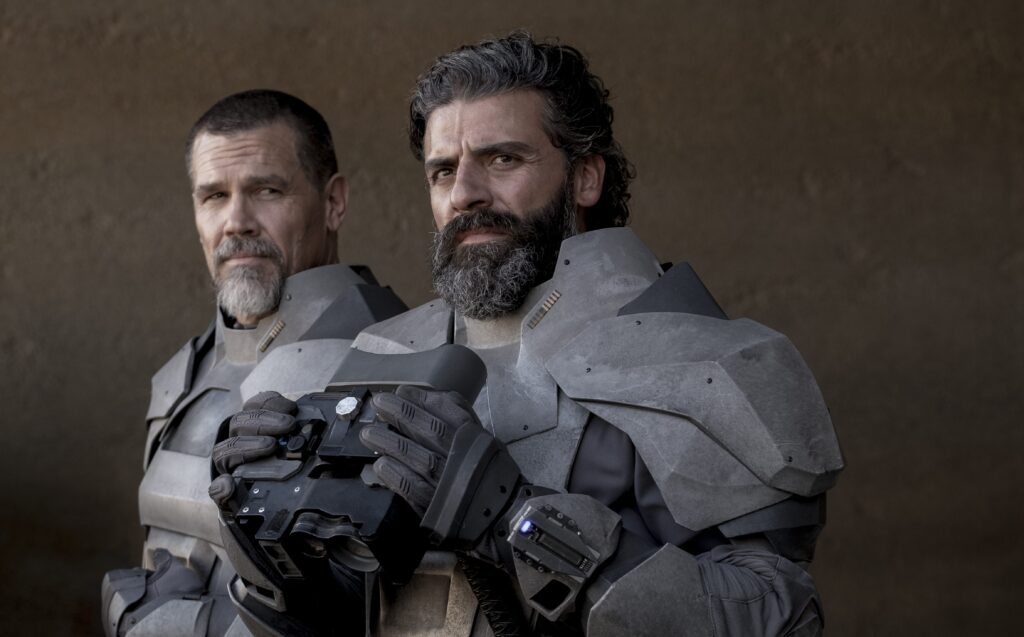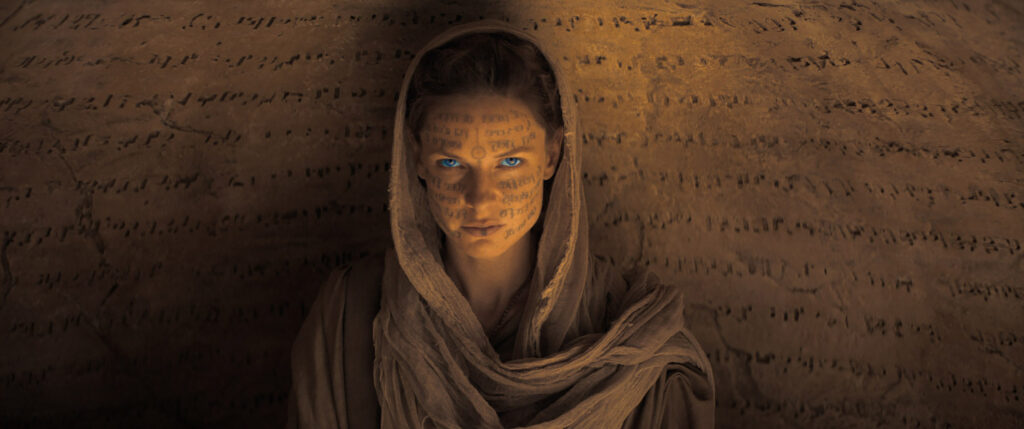
@captzaff007
After the expected delay due to the ongoing COVID-19 pandemic, at long last, director Denis Villeneuve‘s adaptation of author Frank Herbert’s seminal, wildly-influential sci-fi epic, Dune, has hit theaters and HBO Max simultaneously.
Having influenced everything from Star Wars, to Alien, to nearly every single fantasy and sci-fi epic since its publication in 1965, this film has been wildly anticipated (so much so that it’s currently sold out in most theaters in the New York metropolitan area). A sprawling tale of feudalism and mysticism — as well as one of the premiere Chosen One tales in modern fiction — this is an epic story, in every sense of the word.
Beginning on the lush planet Caladan, in the year 10,191 (that’s 10,191 after a great machine war, some thousand or so years from now; not some 9,000 years into our own future), the film begins as the noble House Atreides, overseen by the noble, honorable Duke Leto (Oscar Isaac) has accepted command of the desert planet Arrakis, which had been under control of the rival, cunning, and ruthless House Harkonnen for some 20 years. His son, Paul (Timothee Chalamet) is plagued by dreams of a desert people, of prophetic images of a jihad, and of a mysterious woman, Chani (Zendaya).
His mother, Lady Jessica (Rebecca Ferguson), has been growing uneasy knowing that soon her son — the result of selective genetic breeding via her training through the mysterious, mystical, and highly influential Bene Gesserit sisterhood — might soon come to be the very mystical messiah anticipated to liberate the desert people of Arrakis, the blue-eyed, highly resourceful Fremen. House Atreides arrives on Arrakis, and shortly thereafter are assaulted by the Harkonnens, who, along with the Emperor of the Known Universe himself, has set House Atreides up for failure and elimination.
You got all that? Because…that’s maybe 40% of the plot in this film, the first half of just the the first novel in the series of six novels…and maybe a dozen or so prequels and subsequent posthumous sequels. Villeneuve realizes author Frank Herbert’s immense, sprawling world in such a way that it seems at once both wholly new and entirely recognizable, with the production designs (by Patrice Vermette) and costumes (designed by Jacqueline West and Bob Morgan) curbed generously from Arab and Middle Eastern design, and more than a few holdovers from artists Moebius‘s legendary designs from Jodoworsky‘s aborted 1970’s adaptation.
But it all feels.. logical. The design of the ornithopters, for instance, is so perfect, it is hard to imagine them looking like anything else, especially considering the novel describes them, simply enough, as resembling dragonflies.
Greig Fraser‘s deft and lush cinematography deserves the largest screen possible, with lingering shots of the miles-long Guild Heighliners, and Imperial craft, being rendered with an almost impossible scale; the scope of the sandworms, and sheer inhospitableness of the dunes of Arrakis are made so much more tactile and awe-inspiring with a screen of the appropriate size. He does an incredible job of melding the visual effects with practical sets; something as simple as the desert heat rippling the hull of an ornithopter as it is powering up is so sublime, and is such a tiny attention to detail that helps the film feel so much more real.
Hans Zimmer‘s evocative score — percussive and inherently unique, not like too many other of his scores — is likewise aided with a sound system capable of fully surrounding the viewer, as is the sound design (the effect of Jessica or Paul using The Voice, for instance — something that could risk coming off as goofy — works so perfectly in surround sound).
This being the first part of the first story, the film was able to take its time setting up its universe, and it does so (thankfully, and wisely) by forgoing any exposition and just diving into the story. Titles set up the date, the names of planets, and the relationships of each feudal family to their homeworlds, but little else. The relationships between characters plays out, leaving the audience to fill in the appropriate gaps. That’s perhaps the most refreshing aspect of this adaptation: it trusts its audience, working neither to dumb down the story or characters, nor to just barge full speed ahead without thought to whether the audience can follow.
A lot can be made of how this story is a retread of the white savior trope, or the Chosen One, or its appropriation of Middle Eastern cultures and designs…but all of that is beside the point. The novel upon which this film is based helped popularize and normalize the Chosen One trope found in most science fiction and fantasy, and — should the entire series be adapted to film — is actually the wrong way to dissect and follow this story (the Dune saga gets fucking weird).
As it is, this is an incredibly successful adaptation. I saw it for the second time at the Nitehawk Cinema in Brooklyn, in a packed central theater with stadium seating. My wife, and another couple, sat with me, and no one in our group apart from me had any familiarity with the source novels. None of them were lost in what they had watched, and all of them were engaged in the story. That’s successful filmmaking if ever I saw it.
By the by, I could watch a floating 600 lb. bald Stellan Skarsgard eating ham hocks all day. 4.75/5 Sardaukar!
Dune is playing in theaters everywhere and is available to stream on HBO Max until November 21.





